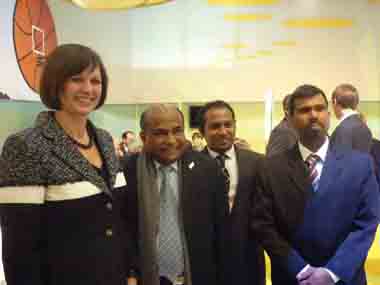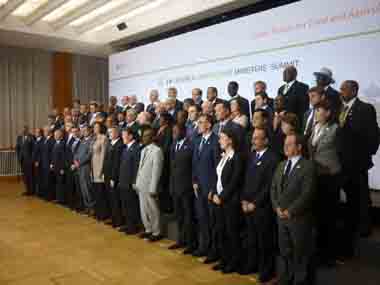 On the invitation of the Federal Ministry of Food, Agriculture and Consumer Protection of the Federal Republic of Germany, Hon. Mahinda Yapa Abeywardena participated at the 05th Berlin Summit of Agriculture Ministers from 17th to 21st January 2013 in Berlin. For the third time Sri Lanka was represented at this annual event, which was attended by 80 Ministers of Agriculture from all around the world and this time focussing on the topic of responsible investment in agriculture. In his speech held in the Weltsaal at the Federal Foreign Office, the Minister thanked Ilse Aigner, Federal Minister of Food, Agriculture and Consumer Protection, for the invitation extended to him to represent Sri Lanka at this summit.
On the invitation of the Federal Ministry of Food, Agriculture and Consumer Protection of the Federal Republic of Germany, Hon. Mahinda Yapa Abeywardena participated at the 05th Berlin Summit of Agriculture Ministers from 17th to 21st January 2013 in Berlin. For the third time Sri Lanka was represented at this annual event, which was attended by 80 Ministers of Agriculture from all around the world and this time focussing on the topic of responsible investment in agriculture. In his speech held in the Weltsaal at the Federal Foreign Office, the Minister thanked Ilse Aigner, Federal Minister of Food, Agriculture and Consumer Protection, for the invitation extended to him to represent Sri Lanka at this summit.
The Hon. Minister emphasised that Investment in agriculture is significant to the development of agricultural productivity and for the achievement of sustainable development. Investment in research, agricultural production and processing and technology diffusion would be essential to increase the productivity in the developing countries, the Minister said. In order to feed the growing population, which would be 9 billion by 2050, this would be a great challenge. "Simultaneously, food production has to take into consideration a number of other worldwide challenges, such as climate change and water scarcity as well as competing demands, including the need to animal feed, fibre for clothing and bio-fuels for energy," he added.
 The world needed new strategies to increase the food production, and innovative technologies were solutions to increase productivity, the Minister said. However, if effective and sustainable government approaches for communication and education of sound fact-based information was not in place, debates could easily become misinformed. "The issue of public acceptance for new technologies is a well-known challenge in agriculture and needs to be addressed by all stakeholders," the Minister added.
The world needed new strategies to increase the food production, and innovative technologies were solutions to increase productivity, the Minister said. However, if effective and sustainable government approaches for communication and education of sound fact-based information was not in place, debates could easily become misinformed. "The issue of public acceptance for new technologies is a well-known challenge in agriculture and needs to be addressed by all stakeholders," the Minister added.
The Hon. Minister further mentioned that rather than bringing new land into cultivation, maximising productivity on existing farmlands is the most productive and environment-friendly option available, rather than bringing new land into cultivation. "This path would address issues such as bio-diversity, carbon sinks, deforestation and other environmental concerns. Accelerating the productivity of existing agricultural land should be of priority," the Minister added.
The Hon. Minister highlighted the importance of capacity building. Basic capacity building at all levels was essential in countries, where agriculture was a predominant sector. Common capacity building had to go hand in hand with more targeted capacity building for science, technology and IT applications in the agriculture sector to achieve tangible outcomes. "There are a number of innovation opportunities – improved farming techniques, the use of crop protection products and fertilizers, new crop varieties derived through conventional hybrid as well as biotech breeding techniques, including but not limited to biotechnology, that need to be given the highest attention," he said.
Hon. Minister emphasized that the contribution of the private sector plays a significant role in agriculture research and development, and that it requires policies and legal frameworks promoting investment, innovation and financial flows in agriculture. "Establishing legal frameworks that promote investment in research and development is essential to meet future needs," he said. The Minister also requested the developed countries to assist the developing countries in a constructive way for the development of the agriculture sector.
On the sideline of the summit, Hon. Minister held meetings with his counterparts of other countries, and they appreciated the fast development in Sri Lanka after the end of the conflict. Dr. Chameera C. Yapa Abeywardena, Coordinator, Nutrition, Ministry of Agriculture, and Kohula R. Ratnasingam, Charge d' Affaire of the Embassy of Sri Lanka in Berlin, also participated in the Summit.